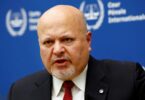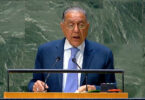NIAMEY, Niger (AFP): Niger’s coup leaders accused the head of the United Nations on Friday of obstructing their participation in the body’s General Assembly, saying it was “likely to undermine any effort to end the crisis in our country.”
Rebel elite soldiers overthrew president Mohamed Bazoum on July 26 and have since detained him at home with his family.
Negotiations to restore civilian rule have yet to bear fruit, with the junta demanding a three-year transition and the Economic Community of West African States (ECOWAS) calling for the immediate return of the democratically elected Bazoum.
The coup has also been strongly criticized by Western governments and global bodies, such as the UN.
In a news release read on public television, the military said UN Secretary-General Antonio Guterres “went astray in the exercise of his mission by obstructing Niger’s full participation in the 78th session of the UN General Assembly.”
It criticized “the perfidious actions” of the UN leader, adding that they were “likely to undermine any effort to end the crisis in our country.”
Global leaders have descended on New York this week for the annual UN General Assembly.
Bakary Yaou Sangare, who before the coup was Niger’s ambassador to the UN and is now its foreign minister, was set to represent Niamey at the gathering.
“Mr Guterres not only refused to take note of the official list of delegates from Niger… but above all acceded to the fanciful request of the former minister of foreign affairs Hassoumi Massaoudou tending to revoke the permanent representative of Niger to the United Nations,” the military statement said.
Niger “forcefully rejects and denounces this clear interference by Mr.Guterres in the internal affairs of a sovereign state,” it said.
Guterres’ representatives have been contacted for comment.
One of the world’s poorest nations, Niger is the fourth country in West Africa to suffer a coup since 2020, following Burkina Faso, Guinea and Mali.
Bazoum’s removal heightened international worries over the Sahel region, which faces growing jihadist insurgencies linked to Al-Qaeda and the Daesh group.
Regional sanctions since the coup mean food and medicines are scarce in landlocked Niger, prices are skyrocketing and there are blackouts after Nigeria cut electricity supplies.
Senegal’s President Macky Sall said on Thursday a diplomatic solution in Niger was “still possible.”
“I hope that reason will ultimately prevail… that it is still possible to move forward reasonably to a solution,” Sall said in an interview with France’s RFI and France 24 media outlets.
He urged Niger’s coup leaders “to not push (us) to the final decision which would be a military intervention.”
The military leaders of Mali, Burkina Faso and Niger signed a mutual defense pact this month, saying they aimed to “establish an architecture of collective defense and mutual assistance for the benefit of our populations.”







